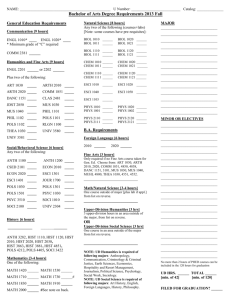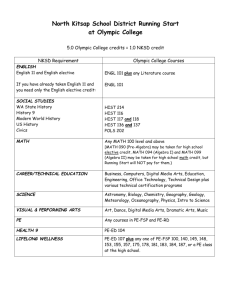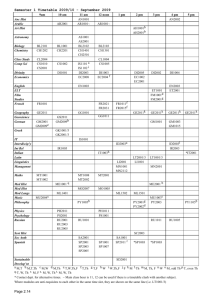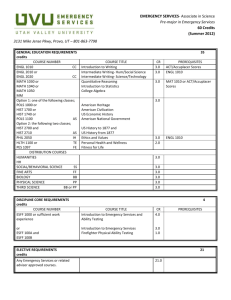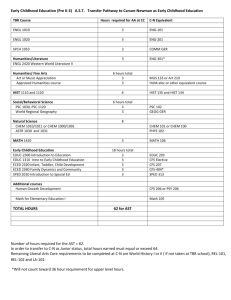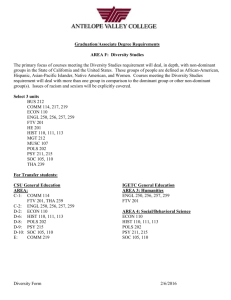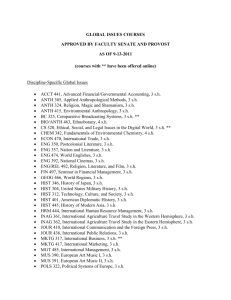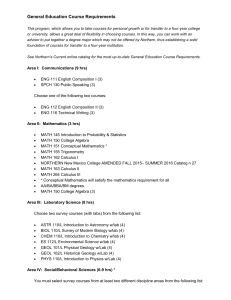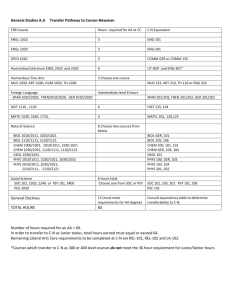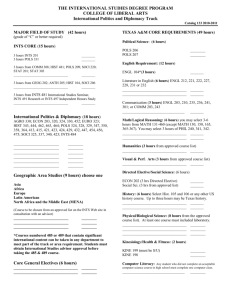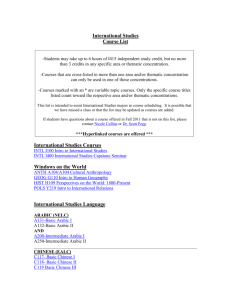General Education requirements
advertisement
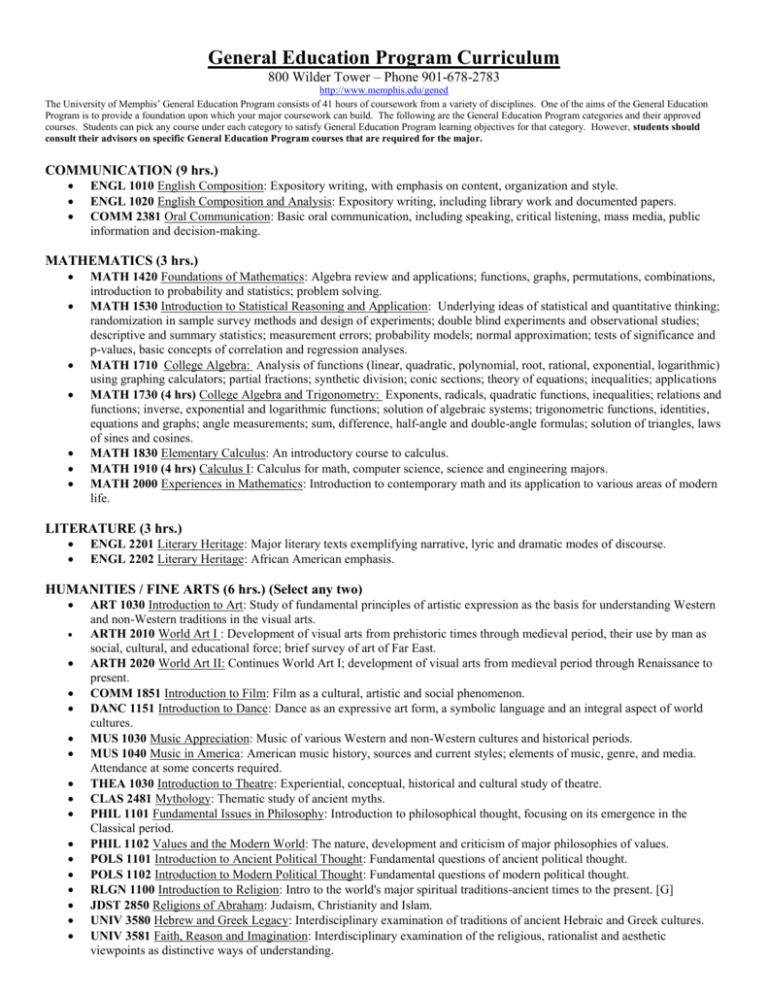
General Education Program Curriculum 800 Wilder Tower – Phone 901-678-2783 http://www.memphis.edu/gened The University of Memphis’ General Education Program consists of 41 hours of coursework from a variety of disciplines. One of the aims of the General Education Program is to provide a foundation upon which your major coursework can build. The following are the General Education Program categories and their approved courses. Students can pick any course under each category to satisfy General Education Program learning objectives for that category. However, students should consult their advisors on specific General Education Program courses that are required for the major. COMMUNICATION (9 hrs.) ENGL 1010 English Composition: Expository writing, with emphasis on content, organization and style. ENGL 1020 English Composition and Analysis: Expository writing, including library work and documented papers. COMM 2381 Oral Communication: Basic oral communication, including speaking, critical listening, mass media, public information and decision-making. MATHEMATICS (3 hrs.) MATH 1420 Foundations of Mathematics: Algebra review and applications; functions, graphs, permutations, combinations, introduction to probability and statistics; problem solving. MATH 1530 Introduction to Statistical Reasoning and Application: Underlying ideas of statistical and quantitative thinking; randomization in sample survey methods and design of experiments; double blind experiments and observational studies; descriptive and summary statistics; measurement errors; probability models; normal approximation; tests of significance and p-values, basic concepts of correlation and regression analyses. MATH 1710 College Algebra: Analysis of functions (linear, quadratic, polynomial, root, rational, exponential, logarithmic) using graphing calculators; partial fractions; synthetic division; conic sections; theory of equations; inequalities; applications MATH 1730 (4 hrs) College Algebra and Trigonometry: Exponents, radicals, quadratic functions, inequalities; relations and functions; inverse, exponential and logarithmic functions; solution of algebraic systems; trigonometric functions, identities, equations and graphs; angle measurements; sum, difference, half-angle and double-angle formulas; solution of triangles, laws of sines and cosines. MATH 1830 Elementary Calculus: An introductory course to calculus. MATH 1910 (4 hrs) Calculus I: Calculus for math, computer science, science and engineering majors. MATH 2000 Experiences in Mathematics: Introduction to contemporary math and its application to various areas of modern life. LITERATURE (3 hrs.) ENGL 2201 Literary Heritage: Major literary texts exemplifying narrative, lyric and dramatic modes of discourse. ENGL 2202 Literary Heritage: African American emphasis. HUMANITIES / FINE ARTS (6 hrs.) (Select any two) ART 1030 Introduction to Art: Study of fundamental principles of artistic expression as the basis for understanding Western and non-Western traditions in the visual arts. ARTH 2010 World Art I : Development of visual arts from prehistoric times through medieval period, their use by man as social, cultural, and educational force; brief survey of art of Far East. ARTH 2020 World Art II: Continues World Art I; development of visual arts from medieval period through Renaissance to present. COMM 1851 Introduction to Film: Film as a cultural, artistic and social phenomenon. DANC 1151 Introduction to Dance: Dance as an expressive art form, a symbolic language and an integral aspect of world cultures. MUS 1030 Music Appreciation: Music of various Western and non-Western cultures and historical periods. MUS 1040 Music in America: American music history, sources and current styles; elements of music, genre, and media. Attendance at some concerts required. THEA 1030 Introduction to Theatre: Experiential, conceptual, historical and cultural study of theatre. CLAS 2481 Mythology: Thematic study of ancient myths. PHIL 1101 Fundamental Issues in Philosophy: Introduction to philosophical thought, focusing on its emergence in the Classical period. PHIL 1102 Values and the Modern World: The nature, development and criticism of major philosophies of values. POLS 1101 Introduction to Ancient Political Thought: Fundamental questions of ancient political thought. POLS 1102 Introduction to Modern Political Thought: Fundamental questions of modern political thought. RLGN 1100 Introduction to Religion: Intro to the world's major spiritual traditions-ancient times to the present. [G] JDST 2850 Religions of Abraham: Judaism, Christianity and Islam. UNIV 3580 Hebrew and Greek Legacy: Interdisciplinary examination of traditions of ancient Hebraic and Greek cultures. UNIV 3581 Faith, Reason and Imagination: Interdisciplinary examination of the religious, rationalist and aesthetic viewpoints as distinctive ways of understanding. HISTORY (6 hrs.) HIST 1110 World Civilization I: Traces forms of civilization from ancient beginnings to 1500. HIST 1120 World Civilization II: Forms of civilization from 1500 to present. HIST 2010 The U.S. to 1877: United States from discovery to the end of political reconstruction. HIST 2020 The U.S. Since 1877: United States from 1877 to present. HIST 2030 History of Tennessee HIST 3863 Social and Intellectual History of the United States HIST 4851 History of Women in America HIST 3881 African-American History POLS 4212 Constitutional Law: The Origins and Evolution of Civil Liberties in the United States POLS 4405 Origin and Development of American Political Thought SOCI 3422 Racial and Ethnic Minorities Comparative study of racial and ethnic minorities in United States. ANTH 3282 Cultural History of American Communities SOCIAL/BEHAVIORAL SCIENCES (6 hrs.) ANTH 1100 Biological Anthropology and Prehistory: Origins of human and human society, behavior and culture. ANTH 1200 Cultural Anthropology: Origin and development of human culture throughout the world. ECON 2010 Introduction to Macroeconomics: Nature and functions of the national economy in a global context. ECON 2020 Introduction to Microeconomics: Operations of the market economy at the individual and firm level. ESCI 1301 Survey of World Regions: Survey of economic, cultural and physical traits characteristic of developing and industrialized nations. ESCI 1401 Introduction to Cultural Geography: Geographical aspects of human behavior. POLS 1030 American Government: Origins, structures and processes of the American system of government. POLS 1301 Intro to Comparative Politics: Comparisons of political issues and systems in a variety of European, Asian & African countries. POLS 1501 International Relations: Conflict, competition and cooperation among global actors in the world arena. PSYC 1030 General Psychology: Introduction to social aspects of psychology as a science of behavior. PSYC 3510 Deviance: Its role in History and Culture: Defamation and glorification of concepts of deviance across cultures. SOCI 1010 Introduction to Sociology: Concepts and methods of sociology, social structure and social institutions. SOCI 2100 Sociology of International Development: Social change in an increasingly interdependent world. CSED 2101 The Family in Global Perspective: Overview of the family as a primary global and social institution. UNIV 2304 Gender and Society: Interdisciplinary study of gender as a social experience among different racial, ethnic, class and cross-cultural groups. NATURAL SCIENCE w/labs (no sequence required) (8 hrs.) BIOL 1010 & 1011 – BIOL 1020 & 1021 Intro to Biology I/II: A study of the biosphere and the structure and functions of its plants and animals. BIOL 1110 & 1111 – BIOL 1120 & 1121 General Biology: Unifying principles of biology: Cell structure, cell function, heredity, origin and development of life. (Designed for students who are majoring in biology or a pre-professional program.) [Prerequisite: CHEM 1110 & 1111] CHEM 1010 & 1011 Chemistry of Materials: Fundamental laws of chemistry and impact of chemistry on modern society; nature of science, scientific measurement, nature of matter; Dalton's atomic theory, modern atomic theory; periodicity, nomenclature; acid based interactions; oxidation-reduction interactions; chemical equilibrium, kinetics; solutions and heterogeneous mixtures. CHEM 1020 & 1021 Chemistry of Life: Basics of organic and biological chemistry: properties, reactions and nomenclature of enzymes, organic functional groups; amino acids, lipids, carbohydrates, nucleic acids and biochemical pathways CHEM 1110 & 1111 – CHEM 1120 & 1121 General Chemistry I /II: (Designed for students who are majoring in a science, math or engineering program.) ESCI 1010– ESCI 1020 Weather and Climate – Land Forms: The Earth and its atmosphere, including climates, oceans, landscapes and environmental hazards. ESCI 1040 or 1050 or 1103 Physical or Historical or Environmental Geology: Processes that operate within and impact the surface of the Earth. PHYS 1010 & 1001 – 1020 & 1002 Introduction to Physics - Astronomy: Physics and Astronomy for non-technical students; natural laws of motion, heat, light and heavenly bodies. PHYS 2110 & 2111 – 2120 & 2121 Physics for Science and Engineering: Calculus-based physics. [Intended for students majoring in science or engineering.]
